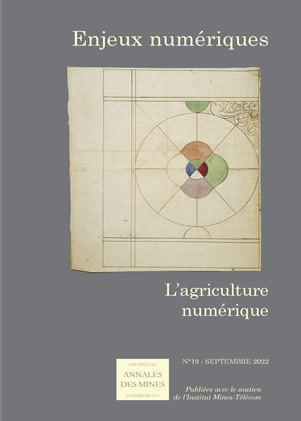|
 N° 19 - Septembre 2022 - L’agriculture numérique N° 19 - Septembre 2022 - L’agriculture numérique
How can precision livestock farming contribute to the principles of agroecology?
By Ludovic BROSSARD
PEGASE, INRAE, Institut Agro, F-35590, Saint Gilles, France
Clément ALLAIN
Institut de l’Elevage, Monvoisin 35650 Le Rheu, France
And
Jean-Baptiste MENASSOL
SELMET, L’Institut Agro Montpellier, CIRAD, INRAE, Univ Montpellier, F-34000 Montpellier, France
Livestock farming systems are facing major currents of transitions with growing consideration for agroecology, “One Health and One Welfare” concepts, and increasing integration of digital technologies and sciences. Precision livestock farming technologies can contribute to the pillars of agroecology, for instance through precision feeding to reduce the inputs required for production; sensors and automata can also help to adopt management practices to improve global health and welfare of animals and farmers. Furthermore, digital technologies can help maintain or promote agroecological livestock farming systems through solutions that monitor animals, and facilitate the management and traceability of practices in more extensive systems, such as mountain farming or pastoralism. Therefore, new technologies have the potential to support agroecological transitions, but will not be the driving force behind these transitions. Possible negative externalities, such as environmental impact of digital technologies must also be weighed against their positive internalities for a successful and sustainable integration of digital tools into agroecological livestock farming systems.
 Télécharger gratuitement l'article Télécharger gratuitement l'article
 Retour au sommaire Retour au sommaire
 N° 19 - September 2022 - Digital agriculture N° 19 - September 2022 - Digital agriculture
How can precision livestock farming contribute to the principles of agroecology?
Ludovic Brossard, Clément Allain & Jean-Baptiste Menassol.
Livestock farming systems are facing major currents of transitions with growing consideration for agroecology, “One Health and One Welfare” concepts, and increasing integration of digital technologies and sciences. Precision livestock farming technologies can contribute to the pillars of agroecology, for instance through precision feeding to reduce the inputs required for production; sensors and automata can also help to adopt management practices to improve global health and welfare of animals and farmers. Furthermore, digital technologies can help maintain or promote agroecological livestock farming systems through solutions that monitor animals, and facilitate the management and traceability of practices in more extensive systems, such as mountain farming or pastoralism. Therefore, new technologies have the potential to support agroecological transitions, but will not be the driving force behind these transitions. Possible negative externalities, such as environmental impact of digital technologies must also be weighed against their positive internalities for a successful and sustainable integration of digital tools into agroecological livestock farming systems.
 Retour au sommaire Retour au sommaire
|




